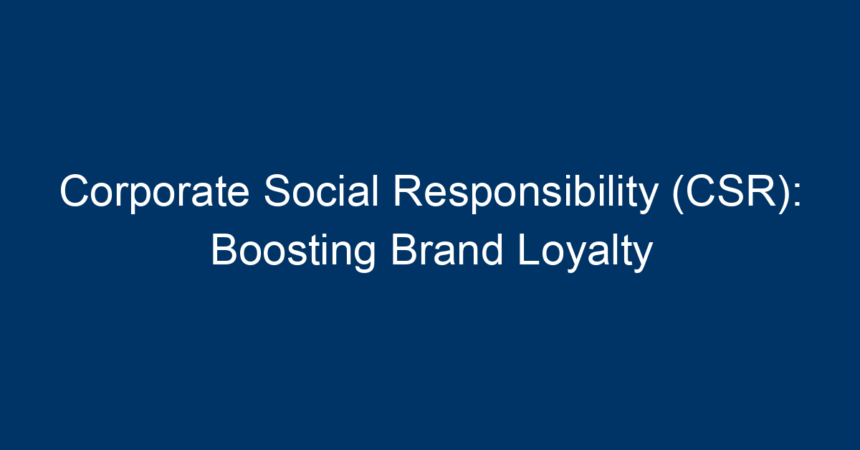In today’s rapidly evolving marketplace, consumers are more informed and conscious about the choices they make. Corporate Social Responsibility (CSR) has emerged as a cornerstone of modern business strategies, not only to contribute positively to society but also to enhance brand loyalty. By embracing CSR, companies can connect more profoundly with their audience, foster trust, and ultimately, drive customer loyalty and profitability.
What is Corporate Social Responsibility (CSR)?
Corporate Social Responsibility (CSR) refers to a company’s commitment to conducting business ethically and contributing to economic development while improving the quality of life for employees, their families, the local community, and society at large. Companies engaged in CSR initiatives are focused on sustainability, ethical labor practices, environmental protection, community engagement, and social equity. This approach has gained traction as customers are increasingly choosing brands that align with their values.
The Importance of CSR in Modern Business
-
Consumer Expectations: Today’s consumers expect businesses to take a stand on social issues. They prefer brands that demonstrate genuine commitment to social responsibility and sustainability. A study by Nielsen found that 66% of consumers are willing to pay more for sustainable brands.
-
Brand Reputation: A strong CSR program enhances a brand’s reputation. When companies invest in CSR initiatives, they send a clear message about their values, which can lead to positive media coverage, customer testimonials, and enhanced credibility.
- Employee Engagement: Engaging in CSR not only appeals to customers but also boosts employee morale and engagement. Employees are more likely to be proud of their work when their company is socially responsible, leading to increased job satisfaction and retention.
How CSR Influences Brand Loyalty
1. Building Trust and Transparency
One of the most significant benefits of CSR is its capacity to build trust. Consumers appreciate transparency in business practices, and when companies openly communicate their CSR initiatives, it fosters a sense of reliability. By promoting honest and ethical practices, companies enhance their image and connect more profoundly with their customers.
2. Connecting Through Shared Values
Today’s consumers often seek brands that share their values. By investing in community-oriented initiatives or sustainability efforts, companies resonate with customers who prioritize these issues. For instance, a company that engages in environmental conservation reflects values that can attract eco-conscious consumers, thus increasing brand loyalty.
3. Enhancing Customer Experience
CSR can significantly enhance the customer experience as brands that give back often provide a narrative that resonates with consumers. This emotional connection results in a more meaningful relationship, leading customers to choose these brands repeatedly over others.
4. Differentiation in a Competitive Market
In a crowded marketplace, CSR initiatives can provide a significant competitive advantage. Companies that integrate social responsibility into their core business strategies stand out and attract consumers looking for more than just products or services. By promoting unique CSR efforts, businesses can capture attention and retain customer loyalty.
Successful CSR Strategies for Businesses
1. Environmental Sustainability Initiatives
Many brands today are taking strides towards becoming environmentally sustainable. This can include reducing carbon footprints, minimizing waste, or implementing eco-friendly packaging. Brands like Patagonia have built their reputation around sustainable practices, creating a loyal customer base that feels good about their purchases.
2. Community Engagement Programs
Investing in local communities through charitable donations or volunteer programs can significantly enhance brand loyalty. For example, TOMS Shoes operates on a “One for One” model, donating a pair of shoes for every pair sold. Such initiatives show consumers that their purchases have a direct positive impact on others.
3. Ethical Labor Practices
Ensuring fair labor practices and ethical sourcing of materials are crucial aspects of CSR. Brands that transparently communicate their commitment to fair wages and humane working conditions foster loyalty among socially conscious consumers. Companies like Ben & Jerry’s are noted for their fair trade initiatives and commitment to social justice.
4. Health and Wellness Campaigns
Incorporating health and wellness into CSR strategies can attract health-conscious consumers. Brands like Coca-Cola have launched initiatives promoting active lifestyles and healthy eating, aligning their corporate ethos with consumer desires.
Measuring the Impact of CSR on Brand Loyalty
1. Customer Surveys and Feedback
Conducting regular surveys allows companies to gauge customer perceptions regarding their CSR efforts. This feedback can provide valuable insights into what initiatives resonate most with consumers and how they influence purchasing decisions.
2. Social Media Engagement
Monitor social media platforms to assess consumer sentiment and engagement regarding CSR initiatives. Positive interactions and discussions can indicate how CSR efforts enhance brand loyalty and reputation.
3. Sales Metrics
Tracking sales data before and after launching CSR initiatives can help businesses understand the direct financial impact of their social responsibility efforts. An increase in sales after CSR campaigns often indicates enhanced brand loyalty.
4. Brand Equity Measurement
Utilizing brand equity measurement tools can help businesses assess the value of their CSR-related brand attributes. Metrics such as brand awareness, perceived quality, and consumer associations provide insights into the effectiveness of CSR strategies.
Actionable Insights for Businesses
-
Develop Authentic CSR Programs: Ensure that CSR initiatives align with your brand values and mission. Authenticity is crucial; avoid jumping on trends simply for marketing purposes.
-
Engage Employees: Involve employees in CSR initiatives to boost morale and create a culture of social responsibility within the organization.
-
Communicate Transparently: Share your CSR efforts openly through marketing campaigns, social media, and community outreach. Transparency builds trust and loyalty.
-
Leverage Partnerships: Collaborate with non-profits or community organizations to enhance the credibility and impact of your CSR initiatives. Partnerships can also expand your reach and resources.
- Regular Evaluation: Continuously evaluate the effectiveness of CSR programs and adjust strategies based on consumer feedback and performance metrics.
Conclusion
Corporate Social Responsibility (CSR) is more than just a trend; it is a vital component of modern business strategy that plays a significant role in boosting brand loyalty. By embracing CSR initiatives, companies can build trust, connect through shared values, enhance customer experiences, and differentiate themselves in competitive markets. As consumer expectations continue to evolve, brands that prioritize social responsibility will not only benefit society but also cultivate a loyal customer base dedicated to supporting ethical and sustainable practices.
Investing in CSR is not just good for the community and the environment; it’s an imperative strategy for any brand aiming for long-term success in today’s market landscape.




